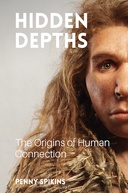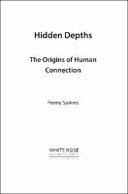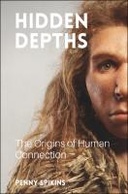Explore

Please note: you can download the full ebook using the above buttons, or download individual chapters using the dropdown menu below.
Read online or download: free
Purchase price for print volume (including shipping and handling fees): £29.15
In Hidden Depths, Professor Penny Spikins explores how our emotional connections have shaped human ancestry.
Focusing on three key transitions in human origins, Professor Spikins explains how the emotional capacities of our early ancestors evolved in response to ecological changes, much like similar changes in other social mammals. For each transition, dedicated chapters examine evolutionary pressures, responses in changes in human emotional capacities and the archaeological evidence for human social behaviours.
Starting from our earliest origins, in Part One, Professor Spikins explores how after two million years ago, movement of human ancestors into a new ecological niche drove new types of collaboration, including care for vulnerable members of the group. Emotional adaptations lead to cognitive changes, as new connections based on compassion, generosity, trust and inclusion also changed our relationship to material things. Part Two explores a later key transition in human emotional capacities occurring after 300,000 years ago. At this time changes in social tolerance allowed ancestors of our own species to further reach out beyond their local group and care about distant allies, making human communities resilient to environmental changes. An increasingly close relationship to animals, and even to cherished possessions, appeared at this time, and can be explained through new human vulnerabilities and ways of seeking comfort and belonging. Lastly, Part Three focuses on the contrasts in emotional dispositions arising between ourselves and our close cousins, the Neanderthals. Neanderthals are revealed as equally caring yet emotionally different humans, who might, if things had been different, have been in our place today.
This new narrative breaks away from traditional views of human evolution as exceptional or as a linear progression towards a more perfect form. Instead, our evolutionary history is situated within similar processes occurring in other mammals, and explained as one in which emotions, rather than ‘intellect’, were key to our evolutionary journey. Moreover, changes in emotional capacities and dispositions are seen as part of differing pathways each bringing strengths, weaknesses and compromises. These hidden depths provide an explanation for many of the emotional sensitivities and vulnerabilities which continue to influence our world today.
Readers may prefer to download and cite from the PDF version of this book. This has a specific DOI and has a fixed structure with page numbers. Guidance on citing from other ebook versions without stable page numbers (Kindle, EPUB etc.) is now usually offered within style guidance (e.g. by the MLA style guide, The Chicago Manual of Style etc.) so please check the information offered on this by the referencing style you use.
This book is included in DOAB.
Why read this book? Have your say.
You must be logged in to comment.
Rights Information
Are you the author or publisher of this work? If so, you can claim it as yours by registering as an Unglue.it rights holder.Downloads
- 64 - pdf (None) at Google Books.
- 97 - mobi (CC BY-NC) at Unglue.it.
- 121 - epub (CC BY-NC) at Unglue.it.
Keywords
- Acheulian
- adaptation
- Affective empathy
- androgens
- anthropology
- Applied ecology
- Approach behaviour
- Approachability
- Archaeology
- Art treatments & subjects
- Attachment
- Attachment fluidity
- Attachment object
- Autism
- Autism Spectrum Condition
- Avoidance behaviour
- Behavioural ecology
- Biface
- Biology, Life Sciences
- Biopsychosocial approach
- Bonding hormones
- Bonobos
- Care-giving
- Cherished possessions
- Chimpanzee
- Cognitive Archaeology
- cognitive empathy
- Collaboration
- comfort
- Community Resilience
- Comparative behaviour
- Compassion
- Compensatory attachment
- convergent evolution
- cultural evolution
- Cultural transmission
- décolonisation
- Developmental psychology
- Dog burial
- Dog domestication
- Early Prehistory
- ecological niche
- Ecological science, the Biosphere
- Emotional brain
- Emotional commitment
- Emotional connection
- Emotional sensitivity
- Emotional vulnerability
- Empathy
- Evolution
- Evolution of Altruism
- Evolution of Emotions
- Evolution of neurodiversity
- Evolutionary biology
- Evolutionary psychology
- Generosity
- Genus Homo
- Group size
- Handaxe
- Helping behaviours
- Hominins
- Human ancestors
- human cognition
- Human demography
- Human Emotion
- Human evolution
- Human figures depicted in art
- Human Origins
- Human self-domestication
- Human social collaboration
- Human-animal relationships
- Humanities
- Humans
- hunter-gatherers
- Hypersociability
- Ice age art
- illness
- injury
- interdependence
- Intergroup collaboration
- Life sciences: general issues
- Lithic transfers
- Loneliness
- Lower Palaeolithic
- Material culture
- Mathematics & science
- Middle Palaeolithic
- Mobiliary art
- Moral emotions
- Neanderthals
- Neurodiversity
- Origin of modern humans
- Origins of healthcare
- Palaeolithic Archaeology
- Palaeolithic art
- Palaeolithic stone tools
- palaeopathology
- physiological responses
- Political activism
- Politics & government
- Prehistory
- Primate behavioural ecology
- Primate social systems
- Psychology
- Raw material movements
- Revolutionary groups & movements
- Rock art
- Selective pressure
- Skeletal abnormality
- Social brain
- Social carnivores
- social cognition
- Social connection
- Social emotions
- Social mammals
- Social networks
- Social safeness
- social tolerance
- Society & Social Sciences
- Sociology & anthropology
- Stress reactivity
- Symbolic objects
- Symbolism
- The arts
- The environment
- thema EDItEUR::A The Arts::AG The Arts: treatments and subjects::AGH Human figures depicted in art
- thema EDItEUR::J Society and Social Sciences::JH Sociology and anthropology::JHM Anthropology
- thema EDItEUR::J Society and Social Sciences::JM Psychology
- thema EDItEUR::N History and Archaeology::NK Archaeology
- thema EDItEUR::P Mathematics and Science::PS Biology, life sciences
- thema EDItEUR::P Mathematics and Science::PS Biology, life sciences::PSA Life sciences: general issues::PSAJ Evolution
- Theory of Mind
- tolerance
- Trust
- Upper Palaeolithic
- vulnerability
- Wolf domestication
- Wolves
Links
DOI: 10.22599/HiddenDepthsweb: http://universitypress.whiterose.ac.uk/site/books/m/10.22599/HiddenDepths/
Editions





